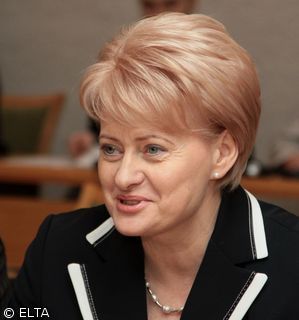European Union supporters in Latvia and Estonia expressed concern Thursday about a new survey pegging their countries as the most EU-skeptical in Europe
Published:
4 August 2003 y., Monday
European Union supporters in Latvia and Estonia expressed concern Thursday about a new survey pegging their countries as the most EU-skeptical in Europe—findings that come just two months before both Baltic states hold referendums on membership. A mere 32 percent of Estonians and 37 percent of Latvians agreed entry would be "a good thing," making them the most pessimistic of those questioned in the EU study released Wednesday. By contrast, 72 percent of Cypriots and 61 percent of Poles said joining would be good for them.
Latvia and Estonia will be the last of 10 EU candidate countries to put the issue of entry to a vote—and observers say there's now a chance that one or both nations could become the first to reject membership in Europe's most powerful multilateral club.
"People are afraid, they don't know what to believe and they're confused," said Pille-Mai Helemae, spokeswoman for the high-profile "Yes to the EU" group in Estonia. "It's going to be a hard fight. But in the end, I'm sure enough people will see more pros than cons to membership." Confusion about the EU was illustrated in the biannual Eurobarometer _ which questioned 1,000 people in each candidate nation in May—with 62 percent of Latvian and 71 percent of Estonian respondents saying they were either poorly informed about the accession process or not informed at all.
The Czech Republic, Hungary, Lithuania, Poland, Slovakia, Slovenia and Malta have already approved EU referendums, most by wide margins. Cyprus is leaving it's decision to lawmakers. If Estonia and Latvia pass their plebiscites on Sept. 14 and Sept. 20 respectively, they would join the EU together with the other candidates in 2004.
Virtually all top leaders in Estonia and Latvia have been pro-EU since the Baltic Sea nations regained independence—arguing that entry will raise their nations international stature, forge vital European trade links and boost living standards.
But official enthusiasm has never been matched outside the halls of power, with many Estonians and Latvians fearing a loss of sovereignty to the EU. Anti-EU groups compare what they say is an overly centralized EU with the U.S.S.R.; one of their symbols is an EU flag stamped with a Communist hammer and sickle.
If the results of the latest survey spooked EU supporters, they delighted opponents. "If you're a EU supporter, I believe the picture is even blacker," said Uno Silberg, who heads Estonia's "No to the EU Movement." "We're confident the referendum will fail."
Šaltinis:
balticsww.com
Copying, publishing, announcing any information from the News.lt portal without written permission of News.lt editorial office is prohibited.
The most popular articles
 You can now access books, journals, films, maps etc from across Europe via the EU's online library, Europeana.
more »
You can now access books, journals, films, maps etc from across Europe via the EU's online library, Europeana.
more »
 Late night chat turned serious when comedian David Letterman admitted he had sex with female employees and was being blackmailed for $2-million (USD) over the affairs.
more »
Late night chat turned serious when comedian David Letterman admitted he had sex with female employees and was being blackmailed for $2-million (USD) over the affairs.
more »
 Last Thursday (1 October) saw an agreement that will lead to the introduction of more efficient tyres for cars and lorries that will cut fuel bills and CO2 emissions.
more »
Last Thursday (1 October) saw an agreement that will lead to the introduction of more efficient tyres for cars and lorries that will cut fuel bills and CO2 emissions.
more »
 The European Job Days are taking place around the EU over the next fortnight, with a centrepiece event in Brussels on 3 October.
more »
The European Job Days are taking place around the EU over the next fortnight, with a centrepiece event in Brussels on 3 October.
more »
 Women, especially migrant and/or poor women, have been harder hit by the financial crisis than men, MEPs heard on Wednesday.
more »
Women, especially migrant and/or poor women, have been harder hit by the financial crisis than men, MEPs heard on Wednesday.
more »
 New EU plan to make local transport efficient and sustainable.
more »
New EU plan to make local transport efficient and sustainable.
more »
 Hollywood heavyweights and European cultural figures are rallying behind jailed film director Roman Polanski.
more »
Hollywood heavyweights and European cultural figures are rallying behind jailed film director Roman Polanski.
more »
 By the time of his death in the Moscow winter 20 years ago, Andrei Sakharov had built an international reputation as a nuclear physicist, human rights activist and Nobel Peace Prize winner His fears over the implications of his work led him to call for peaceful coexistence and later for human rights in the USSR.
more »
By the time of his death in the Moscow winter 20 years ago, Andrei Sakharov had built an international reputation as a nuclear physicist, human rights activist and Nobel Peace Prize winner His fears over the implications of his work led him to call for peaceful coexistence and later for human rights in the USSR.
more »
 The ten nominations for this year's Sakharov Prize, the EP's prize for defenders of human rights and democracy, have now been put forward and will be officially presented at the end of the month.
more »
The ten nominations for this year's Sakharov Prize, the EP's prize for defenders of human rights and democracy, have now been put forward and will be officially presented at the end of the month.
more »
 President of the Republic of Lithuania Dalia Grybauskaitė attended a meeting hosted by the President of Liberia Ellen Johnson-Sirleaf and the President of Finland Tarja Halonen on Peace and Security through Women's Leadership.
more »
President of the Republic of Lithuania Dalia Grybauskaitė attended a meeting hosted by the President of Liberia Ellen Johnson-Sirleaf and the President of Finland Tarja Halonen on Peace and Security through Women's Leadership.
more »